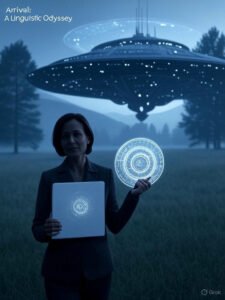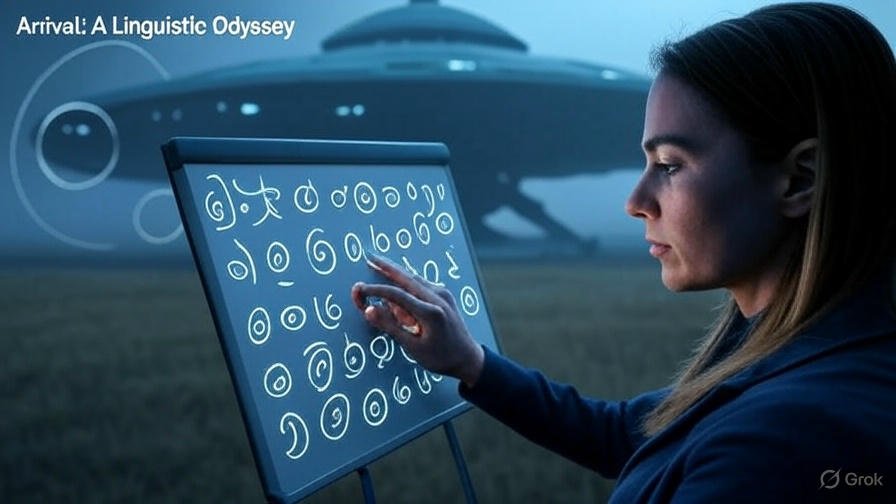A Hilarious and Heartfelt Review of Arrival with Movie✌: When Aliens Drop By and Language Saves the Day
Arrival is a 2016 American science fiction drama film directed by Denis Villeneuve and written by Eric Heisserer, based on the 1998 short story “Story of Your Life” by Ted Chiang. The film stars Amy Adams as Louise Banks, a linguist enlisted by the United States Army to discover how to communicate with extraterrestrials who have arrived on Earth, before tensions lead to war. Jeremy Renner, Forest Whitaker, and Michael Stuhlbarg appear in supporting roles.
On September 1, 2016, Arrival had its world premiere at the Venice Film Festival. On November 11, 2016, Paramount Pictures released the film in theaters in the United States. It grossed $203 million worldwide and received critical acclaim, with particular praise for Adams’s performance, Villeneuve’s direction, and the exploration of communication with extraterrestrial intelligence.
Arrival was named one of the ten “Movies of the Year” by the American Film Institute, making it one of the best films of 2016. It was on numerous critics’ year-end lists.
It received eight nominations at the 89th Academy Awards, including Best Picture, Best Director, Best Cinematography, Best Adapted Screenplay, and won Best Sound Editing. At the 74th Golden Globe Awards, Adams was nominated for the Golden Globe Award for Best Actress, and Jóhann Jóhannsson was nominated for the Golden Globe Award for Best Original Score, respectively, for her performance.
The film was awarded the Ray Bradbury Award for Outstanding Dramatic Presentation and the Hugo Award for Best Dramatic Presentation in 2017. The score by Jóhann was nominated for Best Score Soundtrack for Visual Media at the 60th Grammy Awards.
Plot
Linguist Louise Banks’s daughter Hannah dies at the age of twelve from an incurable illness.
Twelve extraterrestrial spacecraft hover over various locations around the Earth. The affected nations send military and scientific experts to monitor and study them as a result of the widespread panic. In the United States, US Army Colonel Weber recruits Banks and physicist Ian Donnelly to study the craft above Montana.
On board, Banks and Donnelly make contact with two cephalopod-like, seven-limbed aliens, whom they call “heptapods”; Donnelly nicknames them Abbott and Costello. Banks and Donnelly research the complex written language of the heptapods, consisting of phrases written with logograms, and share the results with other nations. As Banks studies the language, she starts to have flashback-like visions of her daughter.
When Banks is able to establish sufficient shared vocabulary to ask why the heptapods have come, they answer with a statement that could be translated as “offer weapon”. China interprets this as “use weapon”, prompting them to break off communications, and other nations follow. Banks argues that the symbol interpreted as “weapon” can be more abstractly related to the concepts of “means” or “tool”; China’s translation likely results from interacting with the heptapods using mahjong, a highly competitive game.
Rogue soldiers plant a bomb in the Montana craft. Unaware, Banks and Donnelly reenter the alien vessel, and the aliens give them a more complex message. Just before the bomb explodes, one of the aliens ejects Donnelly and Banks from the vessel, knocking them unconscious. When they wake, the heptapod craft has moved beyond reach and the US military is preparing to evacuate in case of retaliation.
The alien craft in China is given a deadline by General Shang of China to leave within 24 hours. Russia, Pakistan, and Sudan follow suit; communications between the international research teams are terminated as worldwide panic sets in.
Donnelly discovers that the symbol for time is present throughout the message and that the writing occupies exactly one-twelfth of the 3D space into which it is projected. Banks suggests that the heptapods want all nations to work together to decipher the full message, which is split between the twelve craft.
Banks goes alone to the Montana craft, which sends down a transport pod. Abbott has been mortally injured as a result of the explosion. Costello explains that they have come to help humanity, because in 3,000 years’ time they will need humanity’s help in return. Banks realizes the “weapon” is their language.
Learning the language alters humans’ linear perception of time, allowing them to experience memories of future events. Banks’s visions of her daughter are revealed to be premonitions; her daughter will not be born until sometime in the future.
Banks tells Donnelly that the aliens’ language is the “tool” that was meant by the word “weapon” when he returns to the camp as it is being evacuated. She has a premonition of a United Nations event celebrating global unity achieved by deciphering the heptapods’ language.
At the event, General Shang thanks Banks for persuading him to stop the attack when she called his private number and recited his wife’s dying words. He then shows her his private number and whispers his wife’s words into her ear.
In the present, Banks takes CIA agent Halpern’s satellite phone from a table and calls Shang’s private number to recite the words. The Chinese announce that they are standing down and releasing their twelfth of the message. The other countries
follow suit, and the twelve spacecraft depart.
From what she has learned, Banks writes and publishes a book called The Universal Language, a guide to the heptapod language, which will eventually teach humanity to perceive time the same way as the heptapods.
During the evacuation, Donnelly expresses his love for Banks. They talk about their life choices and whether he would change them if he could see his life from beginning to end. Banks knows that she will agree to have a child with him despite knowing their fate: that Hannah will die from an incurable disease and that Donnelly will leave them both as a result of her revealing that she knew this.
Cast
credit – https://en.wikipedia.org/wiki/Arrival_(film)#Cast
- Amy Adams as Louise Banks
- Jeremy Renner as Ian Donnelly
- Forest Whitaker as Colonel G. T. Weber
- Michael Stuhlbarg as Agent Halpern
- Mark O’Brien as Captain Marks
- Tzi Ma as General Shang
- Abigail Pniowsky as 8-year-old Hannah
- Julia Scarlett Dan as 12-year-old Hannah
- Jadyn Malone as 6-year-old Hannah
Our General Review
Alright, folks, buckle up for a wild ride through the 2016 sci-fi gem Arrival, directed by Denis Villeneuve, because this movie is like a cosmic linguistics class wrapped in a warm, emotional hug with a side of extraterrestrial weirdness. I’m about to spill my thoughts in a way that’s as human as forgetting where you parked your spaceship, as joyful as decoding an alien language, and as humorous as trying to explain time travel to your grandma. This is gonna be a long one, so grab some popcorn (or squid ink, if you’re feeling alien-y) and let’s dive in!
The General Vibe: What’s Arrival All About?
Picture this: one day, you’re sipping your coffee, scrolling through X, and BAM—12 giant, stone-like spaceships (think oversized avocados with attitude) plop down across the globe. No warning, no “take me to your leader” nonsense, just these massive, silent UFOs chilling in random spots like Montana, Siberia, and, I dunno, probably someone’s backyard in Devon. Enter Dr.
Louise Banks (Amy Adams, basically radiating “I’m smarter than everyone but also super relatable” energy), a linguist who gets roped into decoding the aliens’ bizarre, inky-circle language. Alongside her is Ian Donnelly (Jeremy Renner, rocking the “cool nerd” vibe), a physicist who’s there to science the heck out of things. Together, they’re humanity’s best shot at figuring out what these extraterrestrial visitors want before the world’s militaries go full Independence Day and start blowing stuff up.
Arrival isn’t your typical sci-fi flick with laser battles or little green men. It’s a slow-burn, brain-tickling masterpiece about communication, time, and what it means to be human. It’s like if Contact and Interstellar had a baby, but that baby grew up to be a poet with a PhD in linguistics. The movie’s got heart, brains, and just enough weirdness to keep you hooked. Oh, and it’s based on Ted Chiang’s short story “Story of Your Life,” which is basically the nerdiest, most beautiful thing you’ll ever read.
The Good Stuff: Why Arrival Is Out of This World
1. Amy Adams Is Your New Favorite Human
Let’s start with Louise Banks, played by Amy Adams, who deserves all the Oscars, a Nobel Prize, and maybe a lifetime supply of coffee for carrying this movie. Louise isn’t your typical action hero—she’s a linguist, for crying out loud! She’s out here deciphering alien hieroglyphs while the rest of the world is like, “Should we nuke ‘em?” Her performance is so raw and real that you feel every ounce of her curiosity, fear, and determination.
Amy’s eyes do half the acting—those moments where she’s staring at an alien inkblot like it’s a cryptic crossword puzzle? Pure gold. She makes you believe that words (and a whiteboard) can save the planet. Move over, Tony Stark—Louise Banks is the real MVP.
2. The Aliens Are Weirdly Lovable
The aliens, called Heptapods (because they’ve got seven legs, duh), look like a cross between a giant squid and a sentient tree branch. They’re not here to probe anyone or steal our water—they just want to chat, in their own trippy, circular-ink-spray way. Their language is like if Jackson Pollock decided to write poetry, and watching Louise crack it is like watching someone solve a Rubik’s Cube blindfolded. The Heptapods, nicknamed Abbott and Costello (yes, really), are oddly endearing. They’re not cuddly, but they’ve got this chill, “we’re just here to help” vibe that makes you want to invite them over for tea. Or ink. Whatever they drink.
3. The Language Geek-Out Is Next-Level
If you’ve ever nerded out over learning a new language (guilty!), Arrival will make your heart sing. The movie dives deep into the Sapir-Whorf hypothesis, which is a fancy way of saying that the language you speak shapes how you think. The Heptapods’ language doesn’t just sound cool—it rewires your brain. As Louise learns it, she starts experiencing time in a non-linear way, like she’s binge-watching her life on shuffle mode. It’s mind-bending, and the movie makes this high-concept idea feel so human. Plus, the visuals of those inky circles are so mesmerizing, you’ll want to tattoo one on your arm (don’t, though—your boss might think you’re joining an alien cult).
4. The Emotional Gut-Punch
Without spoiling too much (I’m trying, okay?), let’s just say Arrival sneaks in a heart-wrenching storyline about love, loss, and choice that hits you like a ton of bricks. It’s not just about aliens—it’s about what it means to live, even when you know life’s gonna be messy. There’s a scene involving Louise’s daughter that had me sobbing into my popcorn, and I’m not even a crier! The movie weaves this personal story into the sci-fi plot so seamlessly that you’re left feeling like you just watched a therapy session and a space opera at the same time.
5. Denis Villeneuve’s Magic Touch
Denis Villeneuve, the guy behind Dune and Blade Runner 2049, directs Arrival like he’s painting a masterpiece with a spaceship-shaped brush. The visuals are hauntingly beautiful—those misty, looming Heptapod ships feel like they’re straight out of a dream. The pacing is deliberate but never boring, and the score by Jóhann Jóhannsson is like a cosmic lullaby that makes you feel both calm and creeped out. Villeneuve knows how to make you think and feel, which is basically a superpower.
6. It’s a Love Letter to Communication
In a world where everyone’s yelling at each other on X, Arrival is like a warm hug reminding us that listening and understanding are the real keys to survival. The movie’s message is simple but profound: if we can learn to talk to each other (and maybe some aliens), we might just avoid blowing ourselves up. It’s optimistic without being cheesy, and it makes you want to call your mom or learn Klingon or something.
The Not-So-Good Stuff: Okay, It’s Not Perfect
Look, I love Arrival like it’s my own child, but no movie is flawless. Here are a couple of tiny gripes, delivered with a wink:
-
The Military Subplot Feels Familiar: The whole “trigger-happy generals want to shoot the aliens” thing is a bit cliché. You’ve seen it in every sci-fi movie ever—some dude in a uniform shouting, “We can’t trust ‘em!” It’s not bad, but it’s the least original part of the film. Thankfully, Louise’s brilliance overshadows the grumbling soldiers.
-
Jeremy Renner’s Underused: Ian’s a great sidekick, but he doesn’t get much to do besides look cute and make science jokes. Jeremy Renner’s charisma is on point, but you wish the script gave him more to chew on. Like, give the man a whiteboard moment, you know?
-
It’s a Brain Workout: If you’re expecting explosions and alien fistfights, you might find Arrival a tad slow. It’s a thinking person’s sci-fi, so if you’re not ready to ponder the nature of time and language, you might zone out. But honestly, that’s on you—put down the energy drink and engage!
The Joyful, Human Stuff: Why Arrival Feels Like a Hug
What makes Arrival so special is how it balances big, cosmic ideas with small, human moments. Louise’s journey isn’t just about saving the world—it’s about grappling with life’s big questions: Why do we keep going, even when we know pain’s coming? How do we connect with others when we barely understand ourselves? The movie doesn’t shy away from the messy, beautiful reality of being human. It’s like the Heptapods are saying, “Hey, Earthlings, your flaws are kinda cute, but maybe try talking to each other?”
There’s this one scene where Louise is teaching the aliens basic words, and it’s so pure—like watching a toddler learn to say “cat” for the first time. It’s a reminder that communication, even when it’s hard, is what makes us… us. And don’t get me started on the ending (no spoilers, I promise!). Let’s just say it’s the kind of twist that makes you want to rewatch the whole movie immediately, because suddenly every little detail clicks into place like a perfectly solved puzzle.
Humor Break: My Alien Encounter
Okay, let’s lighten things up. Watching Arrival made me wonder what I’d do if aliens showed up at my house. Me: “Uh, hi, want some pizza?” Alien: sprays ink circle that means “pineapple on pizza is a crime”. Honestly, I’d probably try to teach them slang like “yeet” and get kicked out of the spaceship. But seriously, Arrival makes you feel like you could befriend an alien, or at least not totally embarrass humanity.
Why You Should Watch Arrival (Like, Yesterday)
If you haven’t seen Arrival yet, what are you doing with your life? This movie is for anyone who’s ever struggled to understand someone (or something) different, who’s ever felt like time is a weird soup, or who just loves a good story that makes you think and cry at the same time. It’s smart without being pretentious, emotional without being sappy, and sci-fi without being inaccessible. Plus, it’s got Amy Adams being a badass with a dictionary, and that’s worth the price of admission alone.
Final Verdict: 9/10 Inky Circles
Arrival is a beautiful, brainy, soul-stirring ride that’ll make you laugh, cry, and maybe start learning an alien language (or at least Spanish). It’s not perfect, but it’s pretty darn close. Watch it with friends, watch it alone, watch it with your dog—just watch it. And when you’re done, hit me up on X to talk about that ending, because whoa.
Now, if you’ll excuse me, I’m off to practice drawing circular squiggles and pretend I’m communicating with Heptapods. Live long and prosper… or, you know, talk in circles and save the world.
